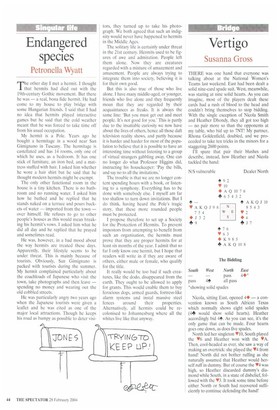Endangered species
Petronella Wyatt
nr he other day I met a hermit. I thought
that hermits had died out with the 19th-century Gothic movement. But there he was — a real, bona fide hermit. He had come to my house to play bridge with some Hungarian friends. I said that I had no idea that hermits played interactive games but he said that the cold weather meant that he was forced to take time off from his usual occupation.
My hermit is a Pole. Years ago he bought a hermitage in a wood near San Gimignano in Tuscany. The hermitage is castellated and has 14 rooms, only one of which he uses, as a bedroom. It has one stick of furniture, an iron bed, and a mattress stuffed with hair. I asked him whether he wore a hair shirt but he said that he thought modern hermits might be exempt.
The only other functional room in the house is a tiny kitchen. There is no bathroom and no running water. I asked him how he bathed and he replied that he stands naked on a terrace and pours buckets of water — imported from the town — over himself. He refuses to go to other people's houses as this would mean breaking his hermit's vows, I asked him what he did all day and he replied that he prayed and sometimes read.
He was, however, in a bad mood about the way hermits are treated these days. Apparently, their lifestyle seems to be under threat. This is mainly because of tourists. Obviously, San Gimignano is packed with tourists during the summer. My hermit complained particularly about the coachloads of Japanese who visit the town, take photographs and then leave — spending no money and wearing out the old cobbled streets.
He was particularly angry two years ago when the Japanese tourists were given a leaflet and he was cited as one of the major local attractions. Though he keeps his road as bumpy as possible to deter visi
tors, they turned up to take his photograph. We both agreed that such an indignity would never have happened to hermits in the Middle Ages.
The solitary life is certainly under threat in the 21st century. Hermits used to be figures of awe and admiration. People left them alone. Now they are creatures regarded with a mixture of amazement and amusement. People are always trying to integrate them into society, believing it is for their own good.
But this is also true of those who live alone. I have many middle-aged, or younger, friends who live alone and they frequently moan that they are regarded by their acquaintances as freaks. It is always the same line: 'But you must get out and meet people. It's not good for you.' This is partly due to the insatiable curiosity we now have about the lives of others, hence all those daft television reality shows, and partly because it is harder and harder for most of the population to believe that it is possible to have an interesting time without listening to a group of virtual strangers gabbling away. One can no longer do what Professor Higgins did, instructing his housekeeper: Pay the bills, and say no to all the invitations.'
The trouble is that we are no longer content spending hours with a book, or listening to a symphony. Everything has to be done with somebody else. I myself am far too shallow to turn down invitations. But I do think, having heard the Pole's tragic story, that these more rounded people must be protected.
I propose therefore to set up a Society for the Protection of Hermits. To prevent impostors from attempting to benefit from such an organisation, the hermits must prove that they are proper hermits for at least six months of the year. I admit that so far I only know one hermit. but I hope that readers will write in if they are aware of others, either male or female, who qualify for the title.
It really would be too bad if such creatures, like the dodo. disappeared from the earth. They ought to be allowed to apply for grants. This would enable them to buy ferocious dogs, armed guards, fortress-like alarm systems and instal massive steel
fences around their properties. Alternatively, all hermits could be recolonised to Johannesburg where all the whites live like that anyway.


























































 Previous page
Previous page